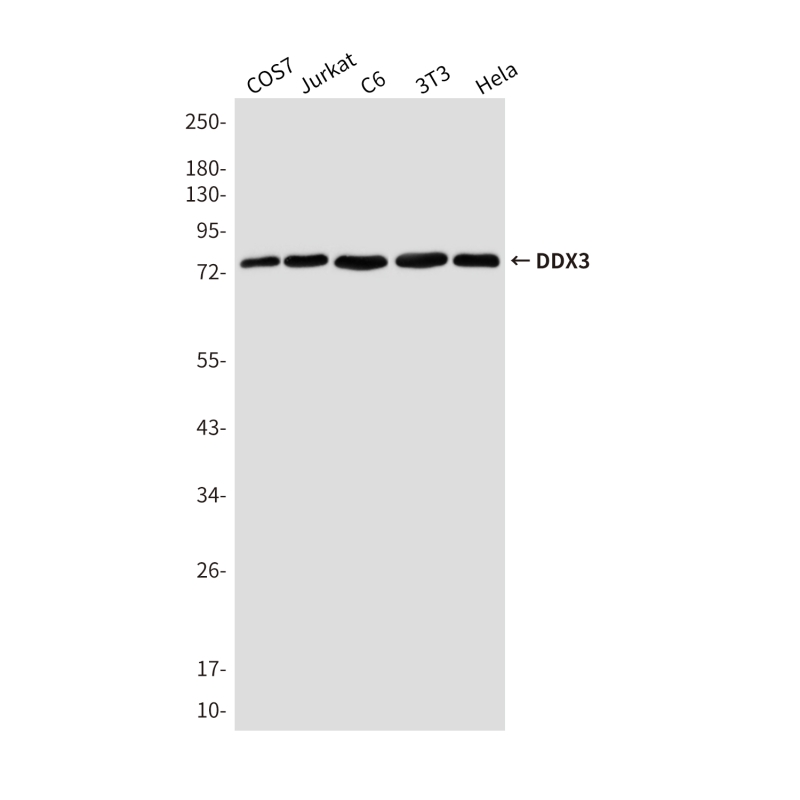
| WB | 咨询技术 | Human,Mouse,Rate,Monkey |
| IF | 咨询技术 | Human,Mouse,Rate,Monkey |
| IHC | 咨询技术 | Human,Mouse,Rate,Monkey |
| ICC | 1/50-1/200 | Human,Mouse,Rate,Monkey |
| FCM | 咨询技术 | Human,Mouse,Rate,Monkey |
| Elisa | 咨询技术 | Human,Mouse,Rate,Monkey |
| Aliases | DBX; DDX3; HLP2; DDX14. |
| Entrez GeneID | 1654 |
| WB Predicted band size | Calculated MW: 73 kDa; Observed MW: 73 kDa |
| Host/Isotype | Mouse IgG2a |
| Antibody Type | Primary antibody |
| Storage | Store at 4°C short term. Aliquot and store at -20°C long term. Avoid freeze/thaw cycles. |
| Species Reactivity | Human,Mouse,Rate,Monkey |
| Immunogen | Purified recombinant human DDX3 protein fragments expressed in E.coli. |
| Formulation | Purified antibody in PBS with 0.05% sodium azide,0.5%BSA and 50% glycerol. |
+ +
以下是3篇关于DDX3抗体的代表性文献及其摘要概括:
---
1. **文献名称**:*"DDX3 DEAD-box RNA helicase is required for hepatitis C virus RNA replication"*
**作者**:Oshiumi H, et al.
**摘要**:该研究通过siRNA和特异性抗体干扰实验,首次证明DDX3蛋白对丙肝病毒(HCV)的RNA复制至关重要,揭示了其在病毒复制复合体形成中的功能。
---
2. **文献名称**:*"DDX3 in HIV-1 infection and sensing: A multifunctional helicase with antiviral activity"*
**作者**:Gringhuis SI, et al.
**摘要**:研究利用DDX3抗体进行免疫共沉淀和细胞定位分析,发现DDX3参与HIV-1感染的先天免疫信号传导,并可能通过调控IFN-β通路发挥抗病毒作用。
---
3. **文献名称**:*"Expression of DDX3 correlates with aggressive tumor phenotypes and poor prognosis in breast cancer"*
**作者**:Sugiura T, et al.
**摘要**:通过免疫组化(使用DDX3抗体)分析乳腺癌组织,发现DDX3高表达与肿瘤转移和患者生存率降低显著相关,提示其作为预后标志物的潜力。
---
4. **文献名称**:*"Targeting DDX3 with a small molecule inhibitor for anti-cancer therapy"*
**作者**:Heerma van Voss MR, et al.
**摘要**:研究开发了靶向DDX3的小分子抑制剂,并利用DDX3抗体验证其对蛋白表达的抑制效果,证明其可通过阻断Wnt/β-catenin通路抑制结直肠癌细胞增殖。
---
这些文献展示了DDX3抗体在病毒机制研究、癌症预后评估及靶向治疗开发中的关键应用。
**Background of DDX3 Antibodies**
DDX3 antibodies are immunological tools targeting the DEAD-box RNA helicase 3 (DDX3X or DDX3Y), a conserved protein involved in RNA metabolism, including transcription, splicing, nuclear export, and translation. DDX3 also regulates cell cycle progression, stress granule formation, and innate immune signaling. Its dysregulation is linked to cancers, viral infections (e.g., HIV, HCV), and neurodevelopmental disorders.
Antibodies against DDX3 are widely used in research to study its expression, localization, and interactions. They enable techniques like Western blotting, immunofluorescence, immunoprecipitation, and immunohistochemistry. Specific clones (e.g., 7G6. D33B3) and polyclonal variants are commercially available, validated for various applications across human, mouse, and other model organisms.
DDX3 antibodies also aid in exploring post-translational modifications (e.g., phosphorylation) and disease mechanisms. For example, they help dissect DDX3's role in Wnt/β-catenin signaling in cancer or its interaction with viral proteins during infection. However, users must verify antibody specificity due to potential cross-reactivity with other DEAD-box proteins. Overall, DDX3 antibodies are pivotal in unraveling the protein's multifaceted roles in health and disease.
×